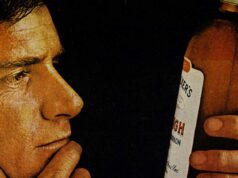As much as we might sling around the phrase “Judeo-Christian,” most of us are pagans at heart.
Scratch modernity, find paganism lurking underneath. Take toasts, as an example. They seem a quaint practice on the surface, now mostly reserved for weddings and retirement parties. The celebrants break out the champagne and pass around the Dixie Cups, holding them aloft as one from among the group stutters out a few kind words and a few more bad jokes. Who among these people knows the origins of this behavior? Who among them knows that the ancient pagans did much the same thing, splashing a few drops of drink on a sacrificial altar to appease the hunting gods? Even the name of the practice seems obscure. Some historians believe that our ancestors used to dunk pieces of scorched bread into tankards of beer or wine to improve the taste, but it is hard to imagine how foul their brew must have been. Modern drinkers consume bitter, dark beers with relish, and none of them seem to grope around them for a chunk of toast to cover the taste.
One historian, Paul Dickson, insists that the modern toast got its start in Bath, England in 1709. The city is named for its magnificent Roman baths, which are reputed to have the power to heal the sick. According to Dickson, an attractive young woman set out to bathe one day. A local lad was so struck by her beauty that he raised up a glass of her bath water and drank it in her honor.
If this is true, then we narrowly avoided a very different custom for our group celebrations. It is easy, if distasteful, to imagine a wedding reception at which both the bride and the groom immerse themselves in a vat of water from which all their guests must cheerfully drink. Hopefully, they would throw in a few croutons to improve the taste. Instead, briefly, toasting became a magnificent tradition. While occasionally falling out of favor (toasting was outlawed by Charles the Great, Maximillian, Charles V, Louis XIV and the entirety of colonial Massachusetts), a well-crafted toast has become a nearly-universal source of pride. From the simplest (a hearty cry of skäl in Sweden or banzai in Japan) to the winding, poetic, hour-long toasts that briefly came into vogue in Ireland, it has been a long time since the hunting gods took any pleasure in the practice. There was a period when no party would be complete without the local wags raising their glasses and reciting a few dozen well-rehearsed toasts they had memorized. We would like to see this practice return, and to that end we offer up a few of our favorites. View these as a starting point; collections of clever sayings and artful witticisms abound, waiting for someone to recite them while holding a liquor glass high into the air.
Here’s to girls and gunpowder!
—Gregory Peck
Drink is the feast of reason and the flow of soul.
—Alexander Pope
A toast to your coffin.
May it be made of 100-year-old oak,
And may we plant the tree together, tomorrow.
—Anonymous
Here’s to cheating, stealing, fighting, and drinking.
If you cheat, may you cheat death.
If you steal, may you steal a woman’s heart.
If you fight, may you fight for a brother.
And if you drink, may you drink with me.
—Traditional Irish toast
Work like you don’t need the money,
Love like you’ve never been hurt,
Dance as if no one were watching,
Sing as if no one were listening,
Screw like it’s being filmed,
And drink every glass like it’s your last.
—Traditional Irish toast
May the devil make a ladder of your backbone
While he is picking apples in the garden of Hell.
—Anonymous
You’ve gained weight, haven’t you?
—Traditional Japanese toast
Champagne to our real friends
And a real pain to our sham friends.
—Anonymous
May you live all the days of your life.
—Jonathan Swift
Friends may come, friends may go,
Friends may peter out, oh you know.
But we’ll be friends through thick and thin,
So long as this bar doesn’t run out of gin.
—Traditional English toast










